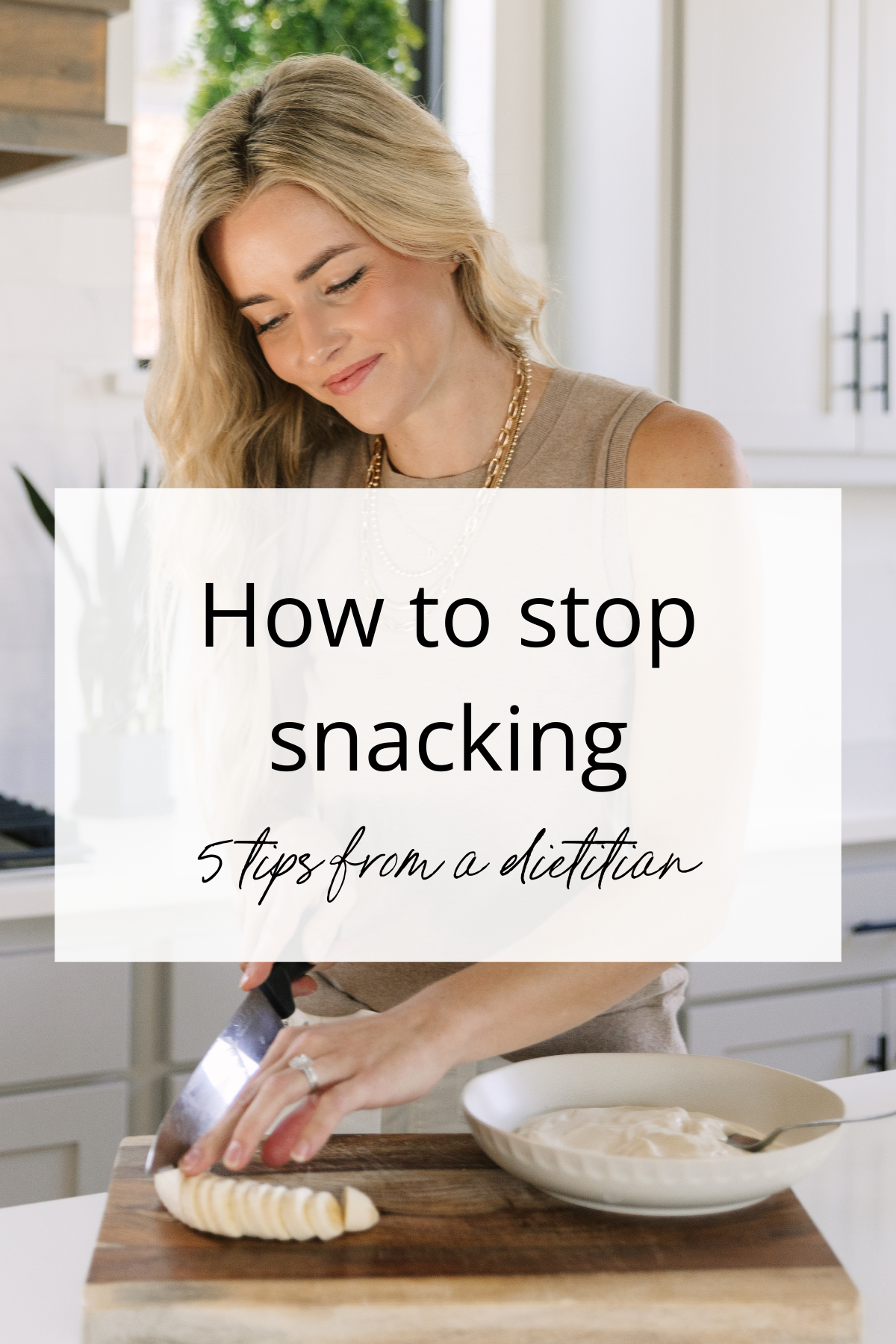How To Stop Snacking: 5 Tips From A Dietitian
While balanced snacks can certainly help you meet your health and wellness goals, feeling hungry all day can be a source of frustration for many. If you find yourself constantly grazing, here are 5 helpful tips from a registered dietitian that focus on the “why” of your hunger and can be useful tools to help you stop snacking.
It’s the end of the day, you sit on the couch and out of nowhere you are hit with an insatiable hunger. This can lead to binge eating at night and can open the door to thoughts like this:
“Why can’t I control myself at night?”
“This snacking made me ruin my entire day of healthy eating.”
“This is why I can’t keep these kinds of foods in the house. I have no self-control.”
Ok maybe this doesn’t happen in the evening for you, but you constantly find yourself standing in front of the pantry longingly searching for your next snack… regardless of how recently you just ate. Sound familiar?
No matter when your snack attack hits, you may be feeling frustrated and looking for tips on how to stop snacking.
Hey, I’m Lauren, I’m a registered dietitian and I’m going to help you stop snacking… excessively that is. The good news? These answers have helped so many people stop snacking! The bad news? I’m going to help you learn how to stop snacking by assessing and addressing the “why” behind your hunger.
While one snack strategy is to build up balanced and nutritious snacks when you feel hungry (and at times, this is the best approach), it is also important to get to the root of the hunger to help stop the snacking before it starts. Let’s get to the root by asking “why am I constantly searching for a snack?”
Based off of my own experience as a dietitian, I’m going to help you answer that question. While there are certainly reasons beyond this list, here are the 5 main reasons why I see people struggle with snacking and how to snacking (excessively), today!
Is it bad to have a snack?
I feel that we need to start here because you may have read the title of this blog and immediately interpreted it as a registered dietitian saying that it is bad to snack and that you should stop. Rest assured, I do not think that at all. In fact, this registered dietitian is VERY pro snack.
So why am I pro-snack? Snacks are a fantastic opportunity to manage your hunger and blood sugar throughout the day, hit your fiber and protein goals, and even sneak in a few more servings of colorful foods than you maybe would have had otherwise.
However, I’m very pro snack when they primarily help you accomplish the above goals that I mentioned. That means that your snacks should be intentionally built up and receive the same “nutrition effort” that you put into planning your main meals. Snacks should be used to nourish, not just fill.
With that, I generally recommend around 2 snacks a day that are a balance of a “base’ and a “protein” food. If you are interested in learning more about my balanced snack method then check out my blog with my tips for strategic snacking.
The reason why snacks tend to get a bad reputation is because we are not filling them the way that they should be filled and we often are not paying attention to them while we eat them. They are often eating out of convenience, which causes us to reach for convenient foods void of nutrients we need.
The focus of today’s snacking blog is for those who feel that they are out of control with snacking… the snacking that always happens late at night or the constant grazing throughout the day. This blog is not to tell you to drop all snacks, but it will help you assess the excessive snacking you may deal with.
5 Reasons Why You Can’t Stop Snacking… And How To Stop
Now, let’ get to the 5 reasons why I see people struggle with snacking… and my tips on how to stop this snacking before it starts. I recommend going in order of this list because I wrote it from the most frequent causes to a few more niche but applicable reasons why people can’t stop snacking.
Let’s get to it:
1) You didn’t eat enough calories during the day.
A deep dive:
Repeat after me- “people who undereat during the day WILL overeat at night.”
The MOST common reason why I see people constantly grazing, specifically at night, is because they under ate during the day or the under ate the day before and their body is trying to play calorie catch up.
Think about it like this, you’re busy all day, you skipped lunch to go to a meeting or grazed off kids leftover crust, you found time to exercise but didn’t find time to have a snack after that workout, and now it’s dinner time. You eat your dinner, yes, but you feel hungry shortly after.
My first piece of advice to stop excessive snacking is to look back at what you ate during the day (or even the day before) and assess if you ate enough. Did you skip some of your meals? Did you not have enough balanced snacks? Did you exercise or have extra movement than your normal?
These reasons, and more, can create a HUGE calorie deficit which explains why you’re feeling insatiably hungry… you’re body doesn’t want to be in too large of a calorie deficit and it will push you to food.
This nighttime hunger is not a lack of self-control, it’s a true physical hunger that we expect from our body. More often than not, people who under eat during the day will overeat at night (or people who under eat during the week will overeat on the weekend... it can look different ways).
How to fix it
Under-eating during the day is the number one reason why people feel hungry at night so how do you fix it? By solving the problem before it becomes a problem and eat enough calories during the day. Do not skip meals. Do not skip snacks. Create time for yourself during the day to feed yourself!
For those trying to lose weight, it’s also important to make sure you are not in too large of a calorie deficit. Despite what common weight loss programs will tell you, less is not always more for weight loss. If you find that you are snacking at night or constantly grazing, really evaluate your calorie deficit.
I recommend being in a minor calorie deficit of 250-500 calories per day, but make an effort to not create a larger calorie deficit than that. It is better to create a calorie deficit that is sustainable over time and helps you minimize feeling out of control around snacks, at night, or on the weekend.
2) You ate enough calories but you didn’t eat balanced calories.
A deep dive:
Maybe you looked back at your day, and you ate 2,000 calories of your 2,000 calorie need. You were right on target, calorically speaking, so why are you still feeling hungry?
Once you look at HOW MUCH you ate, now we want to look at WHAT you ate. What did that 2,000 calories consist of? Was it satiating meals and snacks with protein, fiber, and high volume colorful foods or was it unbalanced meals and snacks?
Different nutrients fill us up for longer, keeping us full and satisfied throughout the day and into the evening. If you look back at your meals and snacks and realize you were missing out on protein and didn’t choose high fiber carbs, that could be another explanation for why you feel hungry at night.
Another thing I will add here is that it is completely natural for hunger levels to vary throughout the day… this is one fact that makes strict calorie allotments difficult to stick to. Hormones, exercise, stress, sleep, and general life activity all change hunger levels.
How to fix it:
We don’t just want enough calories, we want balanced calories too. To ensure you are eating meals and snacks that are satisfying I recommend:
For snacks: pair a base and a protein. I have entire blog posts dedicated to how to build a balanced snack for you to read including:
For meals: I recommend following the plate method as often as you can. The plate method that I recommend is is ¼ plate protein, ¼ plate high fiber carbohydrate, and ½ plate color (like fruits and vegetables).
This plate is a nutrient dense, calorie controlled plate that features foods groups and nutrients that will leave you feeling satisfied.
3) The emotions of the day are hitting you.
A deep dive:
This is one of the most common reasons why I see people snacking at night specifically. For this deep dive, we are going to walk through a day together.
You start by waking up on the wrong side of the bed. Your kids were late to school because siblings like to fight at 7:45am. You spilled your coffee AND you forgot that you had a work assignment due that day. You scramble to finish the work assignment and get it done just in time. You head home and seem to hit every light red. You forgot an ingredient for dinner, so have to head back to the store. You make the dinner but no one likes it. You finally get the kids to bed after a toothbrush battle. You finally sit on the couch and suddenly you feel hungry. You already walked through the first two causes of nighttime hunger and you know that you ate enough calories from balanced food groups. So what gives?
I would argue here that the stress of the day, stress you never had time to address, is hitting you. You have finally slowed down and given yourself TIME to feel the emotions of the day… and those emotions are stress, anger, frustration. Where do those feelings push you?
For many people, these emotions are pushing them towards feelings of comfort and that comfort can often be sought after with food.
How to fix it:
This is an INCREDIBLY common cause of nighttime snacking and I find that this specific cause is the most frustrating for people because emotions can be hard to identify and difficult to address. This is a fantastic example of focusing on WHY you feel hungry when you do, and you’re WHY here is emotion.
So, I recommend you respond to that emotion in a way that will truly satisfy and calm the feeling. While food is not 100% off limits here, it is incredibly important to gain emotional awareness here so that you can give your body what it is truly craving.
Sometimes food can give a cozy comfort, but there are other strategies that can truly get at the root of an emotion! If you find that you eat out of emotions throughout the day, one great example of another way to cope would be using exercise to release mood boosting endorphins in the body.
Here are a few specific emotions that push people towards food and suggestions that could help address the emotion:
As I said, sometimes food IS the comfort that people reach for and that is ok at times. However, I love to use these other emotion management tools because they actually get at the root of the emotion, such as exercise releasing endorphins, instead of blanketing a feeling that way that food can.
Emotional hunger can be incredibly difficult to manage, and the suggestions in the table above are just that… suggestions. There are many emotional eating therapists and registered dietitians who specialize in emotional eating who could be fantastic resources for you if this section resonates with you.
4) Habitual hunger
A deep dive:
Most of us humans are creatures of habits. We eat the same breakfast every day. We drive the same route to work. We go to the same restaurants. We know what we like, we create a habit of it, and we stick to it. This can be seen in snacking as well.
I think the most important thing to note here as that habitual hunger often includes snacks that are built up because of TIME and not because of a HUNGER CUE. Habitual snacking winds up on your plate regardless of whether you are actually hungry for it or not.
I’ll be honest with you, this was MY main reason for snacking at the times that I did. I created a habit of eating a snack when I got home from work and I also created a habit of eating a snack every time I sat on the couch… somehow, those two times of my day and a snack became inextricably linked.
It’s good to pause here and think to yourself: “Am I reaching for a snack at the same time every day regardless of my hunger levels?” If you are able to identify those times, let’s see how to address it:
How to fix it:
Please do not hear me say that you can never have a snack when you sit on the couch… you can! However, the purpose of this blog is to help you recognize the WHY behind your actions or your hunger and sometimes, it’s a habit.
There are a few ways that you can address habitual hunger but it all begins with recognizing that it is a habit to begin with. I realized that I wasn’t even really hungry at night… that a lot of my “hunger” was actually because my couch time didn’t feel complete without a bowl of popcorn or an ice cream bar.
One way to address this habit is by changing up your scenery. If you recognize that you have the couch connected with snacks, try spending more time in other areas of your home like doing a puzzle at the counter, reading a book in the bath, or even watching the show in your bed.
Another way to address the habit is to eat night time snacks in places that are designated for eating like the dining table or a bar top. Not only does this break the connection between the couch and a snack, but this approach also helps you eat more mindfully and pay attention to the snack you have chosen.
Finally, a third way to address habitual hunger is by changing your routine itself. If you get home from work, drop your bags, and immediately head to the pantry for a 5 pm snack (assuming you are not ACTUALLY hungry), then try rerouting your routine to see if that disconnects the time from the pantry.
5) You’re over-tired
A deep dive:
Finally, the last primary root of excessive snacking that I have seen is that you are overtired. People severely underestimate the role that sleep plays in their health but the link, especially with appetite, goes all the way down to a biochemical level.
Sleep deprivation affects our physical state and hunger cues in a few ways. First, sleep deprivation can alter glucose metabolism (the way your body processes carbs and energy) which in turn changes our hunger and fullness cues.
Second, some people confuse true tiredness or an afternoon “slump” with hunger and will use food to pick up their energy levels… especially during the day. While food will definitely give you energy, this is actually not the refuel that an overtired person is needing.
Finally, lack of sleep directly impacts our hunger and fullness hormones: grehlin and leptin. In fact, some research shows that even just one night of sleeplessness can increase grehlin (our hunger hormone) and decrease leptin (our fullness hormone).
How to fix it:
Focus on your sleep health! Turn off your electronics early, take an early night in, sip on some relaxing tea and get some rest. This will give your body the fuel it craves and help you better enjoy your food throughout the day.
The takeaway:
While snacks are not bad, snacks should be viewed as an opportunity to nourish your body and hit your health goals as often as possible. To me, snacks should be given the same amount of time and preparation as your meal-prepped meals so that they can best nourish your body.
If you have the goal to stop snacking or want to get back in control of nighttime snacking or daily grazing, I recommend you focus on the “why” behind your hunger instead of just looking for the “what” to eat.
These 5 reasons are why I see people feel out of control around snacking and hopefully you took away some helpful tips to help you stop snacking excessively, today!
Liked this blog? You may also like:
Disclaimer: please note that I am a registered dietitian but I am not YOUR registered dietitian. This information is meant to be educational and should not be used as personalized medical or nutrition advice.Hey! I’m Lauren
I’m a registered dietitian and my goal is to give you tips and tricks to make healthy eating fun, easy, and even delicious!








